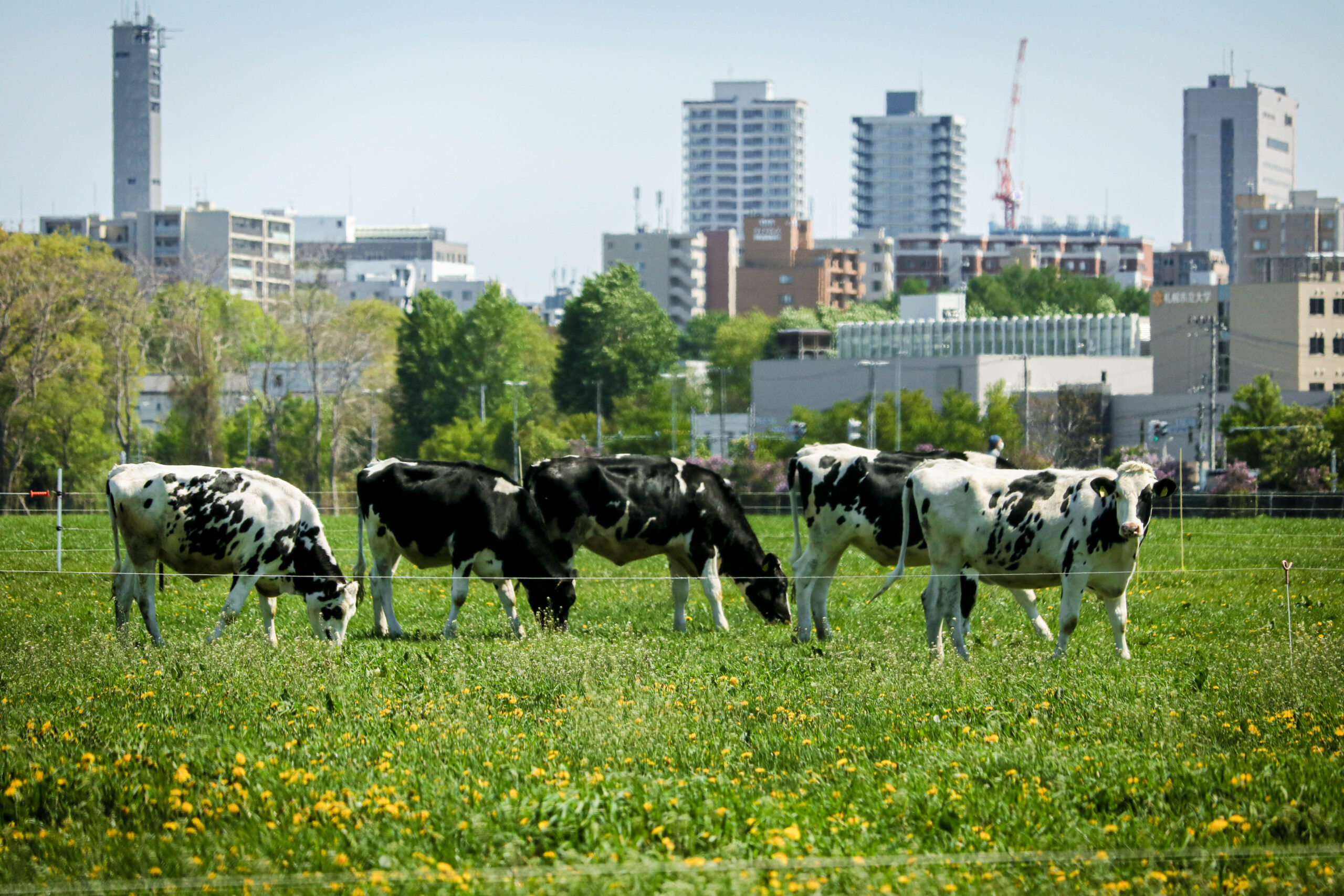Towards zero-carbon agriculture through ‘healthy farming’
University News | July 19, 2023
First published on March 18, 2023, on University World News
Hokkaido University, situated on the northern island that is Japan’s breadbasket, is a leader in agricultural technology, supporting Japan’s transition to green growth and contribution to global sustainability.

The Model Barn in Experimental Farm No. 2, Hokkaido University.
Japan’s agriculture sector produced greenhouse gases equivalent to about 50 million tonnes of carbon dioxide in 2019, according to the Ministry of Agriculture, Forestry and Fisheries in Tokyo.
National efforts to combat earth-warming emissions are based on new technologies targeting areas such as plant-based foods, regenerative farming that protects the environment, and reforming agricultural management practices that currently prioritise profits over protecting the climate.
Reducing greenhouses gases by 2050 is also a key agenda item for the upcoming Group of Seven (G7) summit in Hiroshima in May hosted by Japan. Japan is slated to lead the way by investing in decarbonising technology in countries to help achieve a carbon-neutral society.
Soil scientist Yoshitaka Uchida, an expert in farming that protects soil nutrients and reduces land degradation, is a participant in Hokkaido University’s programme to support the United Nations Sustainable Development Goals. He promotes a holistic approach in his research, which is based on a wide spectrum of methods ranging from technology to analysing and harnessing consumer demand.
An ‘interesting moment’
“It is an interesting moment as governments and people are looking for alternatives,” he told University World News.
The United Nations Food and Agriculture Organization reports that just 11% of the world’s fertile farmland currently feeds 80% of the global population, highlighting the urgent need to improve the fertility of the remaining 89% through soil that also contributes to a carbon-free society.
Uchida notes that regenerative farming – producing food without harming the environment – is key. For example, protecting naturally occurring microbes in soils improves crop productivity that is threatened by land degradation from chemical fertiliser use. Healthy soil contains hordes of bacteria and fungi essential for plant output.
Healthy soil also absorbs more carbon dioxide that would otherwise contribute to global warming. Laboratory research monitors soil health by calculating the loss of soil nutrients, gathering data on changes in soil’s carbon emissions from healthy farmland. Carbon and plant sequestration is also used to check the ecosystem balance.
Working with farmers on the ground
A major pillar of healthy soil to improve farm productivity is leveraging the knowledge of farmers on the ground. “Soil science research is therefore multidisciplinary and education is key to create impact,” said Uchida, who also leads the soil education programme at Hokkaido University.
“Findings from our ongoing pilot studies on soil science education with farmers indicate that sharing the importance of soil nutrient protection with farmers, consumers and local governments creates new innovative practices to reduce greenhouses gases from chemically fertilised agriculture,” Uchida said.
The research is also shared with Japan’s influential farming cooperatives that provide funding and training to farmers and establish market mechanisms.
Their workshops to share scientific research with diverse stakeholders have become an important platform on ‘healthy soil’ education and the need for change, he noted.
Working with existing practices
Uchida and his team of researchers on soil biology and climate change, which include researchers from the humanities and social sciences, comb the rural swathes of Hokkaido, meeting with farmers and village and town officials to listen and learn from their activities.

The Faculty of Agriculture, Hokkaido University
He believes it is essential to work with existing practices to ease the shift towards soil nutrient- based agriculture while maintaining productivity. “Continuity of these systems, that have a wealth of knowledge and experience, is beneficial to the process of reform,” he pointed out.
Poor soil security which does not protect nutrients in the soil also contributes to declining farming populations and threatens Japan’s food security as loss of productivity from use of chemical fertilisers pushes farmers off the land. The Japanese government estimates more than 6% of Japan’s farms currently lie abandoned, and links this to lack of farmers.
Uchida is helping local towns adopt policies or directives that include extending subsidies aimed specifically at shoring up healthy farming.
This will pave the way for innovations such as new ventures between livestock farmers and dairy businesses entering the government’s carbon-credit schemes. Participating businesses will set emission credits that can generate crucial funds for farmers to embark on healthy soil-based agricultural production.
Consumers’ role
Tapping consumer support for healthy farming is another opportunity eyed by Uchida. He is investigating the opportunities provided by the government’s highly popular hometown tax support scheme, which increases donations by urban populations to rural local governments. In return, the local governments reciprocate with a gift to the donor, which is usually locally produced goods.
Consumers can play a role in expanding healthy agriculture. For example, Uchida’s support for grass-fed beef from farms that do not rely on chemical fertilisers is bringing change in Hokkaido.
Lean beef – not the expensive marble variety famous in Japan – is produced from cattle that roam freely in local fields and is produced by a farmer on a once-abandoned 81-hectare farm in Kuromatsunai, a town in southwestern Hokkaido. Local restaurants have begun to buy the meat and also produce carbon-free menus popular with consumers.
Uchida and his team are monitoring the impact of grass-fed cattle on the farm environment and for its retention of microbes in the soil. “Nature-based livestock farming is preserving the original eco-cycle. We noted, for instance, less changes in the grass, and that cattle dung is luring insects that had disappeared when fields contained chemical fertiliser,” he said.
Reducing methane gas
Reducing methane gas emitted by cattle is another area of research at Hokkaido University that is key to Japan’s decarbonisation efforts.
Professor Yasuo Kobayashi, animal function and nutrition expert at Hokkaido University’s graduate school, leads a programme to control emissions from cow burps which government statistics indicate are responsible for almost eight million tonnes or 16% of carbon dioxide emissions from Japanese agriculture.

Cattle at Experimental Farm No. 1, Hokkaido University.
Japan’s beef cattle farming is lucrative. Its production value was estimated at approximately JPY739 billion (US$5.6 billion) in 2020. Japan also imports more than 10 million tons of corn annually for livestock feed that is a major source of emissions.
Kobayashi aims to reduce emissions by 80% by 2050 based on reductions on diverse fronts and in collaboration with researchers in top universities in Japan such as the University of Tsukuba and the University of Tokyo, he told University World News.
Findings from ongoing trials at Hokkaido University showed a 20% reduction of methane gas from the stomachs of selected cows that were fed with feed containing liquid derived from imported cashew nut shells. However, Kobayashi acknowledged the high import costs would not be attractive for many farmers. Ongoing research is focusing on locally grown feed that results in methane reductions.
“My research is a crucial survival means for Japan’s livestock industry, hit by soaring energy prices that have jacked up imported feed [costs] following the Ukraine war,” he explained.
The research team is also developing a small capsular device that can be swallowed by cattle to measure methane fermentation data and contribute to optimal feeding methods by farmers.
Kobayashi’s project is supported by the Moonshot Research and Development Program, extended since 2020 to strengthen science and technology through pioneering research. Launched under the Japan Science and Technology Agency, the fund is mandated to address challenges facing humanity, such as global warming.
Clean earth and food supply sustainability is one of the programme goals.
Written by Suvendri Kakuchi, Tokyo Correspondent for University World News
This is the third in a series of articles on the SDGs in partnership with Hokkaido University. University World News is solely responsible for the editorial content.
